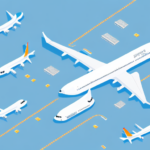The Impact of COVID-19 on the Aviation Industry
The COVID-19 pandemic has had a profound effect on the aviation industry, leading to an unprecedented decline in air travel. Global lockdowns, travel restrictions, and quarantine measures have significantly reduced passenger demand. According to the International Air Transport Association (IATA), the airline industry was projected to lose approximately $118.5 billion in 2020 due to the pandemic.
Beyond financial losses, the pandemic has caused airlines to reevaluate and modify their operations. Workforce reductions, route cancellations, and grounded aircraft have become commonplace as airlines strive to reduce operational costs. Additionally, the implementation of safety measures such as mandatory mask-wearing, enhanced sanitation protocols, and contactless check-in procedures have become standard practices to ensure passenger and crew safety.
As the world gradually recovers, with countries easing travel restrictions and reopening borders, the aviation industry is witnessing a gradual resurgence in demand. However, experts predict that full recovery may take several years, highlighting the necessity for ongoing adaptation and resilience within the industry.
Significance and Challenges of Legacy Carriers
Overview of Legacy Carriers
Legacy carriers are established airlines with long-standing histories in the aviation sector. They are characterized by extensive networks, strong brand recognition, and a loyal customer base. Renowned for providing high levels of service and maintaining robust safety records, legacy carriers play a pivotal role in connecting passengers to numerous global destinations, particularly through long-haul flights.
Economic Contribution
Legacy carriers significantly contribute to the global economy by creating jobs and fostering growth within the tourism industry. They employ a vast workforce, including pilots, flight attendants, ground staff, and maintenance crews. Furthermore, these airlines often collaborate with hotels, car rental firms, and other travel-related businesses, thereby stimulating economic activity and supporting various sectors.
Challenges Faced
Operating in a highly competitive environment, legacy carriers face numerous challenges, including fluctuating fuel prices, intense competition from low-cost carriers, and evolving market conditions. To maintain competitiveness, these airlines have implemented cost-cutting measures such as reducing flight frequencies, increasing fees for ancillary services, and streamlining operations.
Legacy Carriers During Past Economic Downturns
The 2008 Financial Crisis
During the 2008 financial crisis, legacy carriers like American Airlines and Delta Air Lines adopted various strategies to navigate the downturn. These included reducing capacity by cutting back on flights, laying off employees, and retiring older, less fuel-efficient aircraft to lower operational costs. Additionally, these airlines formed strategic partnerships with other carriers to expand their network reach and stabilize revenue streams.
SARS Outbreak in 2003
The SARS outbreak in 2003 similarly impacted airlines such as Cathay Pacific and Singapore Airlines. These carriers responded by reducing flights to affected regions, offering flexible ticketing options to accommodate uncertain travel plans, and enforcing stringent hygiene protocols to assure passenger safety. Collaborative efforts with other airlines to share resources also helped mitigate the financial strain during the crisis.
Strategies for Innovation and Adaptation
Technological Innovations
In the face of evolving challenges, legacy carriers are investing in technology to enhance operational efficiency and customer experience. Implementing self-service kiosks, mobile check-in systems, and advanced baggage handling solutions have streamlined airport processes, reducing wait times and operational costs.
Sustainability Initiatives
Sustainability has become a key focus for legacy carriers as they seek to minimize their environmental impact. Airlines are exploring the use of alternative fuels, investing in more fuel-efficient aircraft, and adopting recycling programs. These initiatives not only reduce carbon emissions but also align with the growing consumer demand for environmentally responsible travel options.
Cost-Cutting and Revenue-Boosting Measures
Cost-Cutting Strategies
To manage the financial strain caused by reduced passenger demand, legacy carriers have implemented several cost-cutting measures. These include:
- Reducing flight capacity and consolidating routes
- Retiring older aircraft to decrease maintenance and fuel costs
- Implementing employee furloughs or layoffs
- Optimizing supply chains and renegotiating supplier contracts
Additionally, many airlines have reduced or eliminated in-flight services, such as complimentary meals and entertainment systems, and have introduced fees for services like checked baggage and seat selection to generate additional revenue.
Partnerships and Collaborations
Strategic partnerships and collaborations have become vital for legacy carriers seeking to enhance revenue streams. By forming alliances with other airlines, carriers can share resources, expand their network reach, and increase revenue through code-sharing agreements. Collaborations with travel service providers, including hotels and car rental companies, enable the creation of bundled travel packages, offering customers a more comprehensive and convenient booking experience.
Furthermore, partnerships with technology companies have allowed airlines to incorporate innovative solutions, such as seamless transportation options through ride-sharing integrations and secure mobile payment systems for in-flight purchases. These alliances not only enhance the overall customer experience but also open up new revenue opportunities.
Enhancing Customer Experience and Revenue Streams
Investment in New Technologies
Legacy carriers are investing in cutting-edge technologies to improve the passenger experience. Innovations such as biometric identification systems, which utilize facial recognition and fingerprint scanning, expedite the boarding process and enhance security. Additionally, the introduction of virtual reality headsets for in-flight entertainment offers passengers a more immersive and enjoyable journey.
Diversification of Service Offerings
To attract a broader customer base, legacy carriers have diversified their service offerings. The introduction of premium economy cabins provides an affordable yet enhanced travel option for passengers not willing to pay for business or first-class seats. Expanding route networks to include regional destinations also allows airlines to tap into new markets and cater to a more diverse clientele.
Moreover, by partnering with other companies to offer bundled services, such as flight, accommodation, and car rental packages, legacy carriers can provide a more seamless and value-driven travel experience, thereby increasing customer loyalty and revenue.
Sustainability and Environmental Responsibility
In response to increasing environmental concerns, legacy carriers are prioritizing sustainability and environmental responsibility. Key initiatives include:
- Adopting sustainable aviation fuels to reduce carbon emissions
- Investing in fuel-efficient aircraft to lower fuel consumption
- Implementing recycling programs and reducing single-use plastics onboard
- Using electric ground support equipment to minimize emissions on the ground
These measures not only contribute to environmental conservation but also enhance the airline's brand image and appeal to environmentally conscious consumers.
Future Outlook for Legacy Carriers
Despite the ongoing challenges posed by the COVID-19 pandemic, legacy carriers possess several strengths that position them for recovery and continued success. With established brand recognition, extensive customer bases, and robust financial foundations, these airlines are well-equipped to navigate the evolving aviation landscape.
Moving forward, legacy carriers will need to persist in their efforts to innovate and adapt to ongoing market changes. Emphasizing improvements in customer experience, embracing sustainability, and expanding into new revenue streams will be crucial for maintaining competitiveness. By integrating cost-effective measures, forming strategic partnerships, and investing in technology, legacy carriers are likely to sustain and potentially enhance their market positions in the post-pandemic era.
Additionally, as consumer preferences shift towards greater environmental awareness, the prioritization of sustainability initiatives will not only fulfill regulatory requirements but also meet the ethical expectations of modern travelers. By continuing to evolve and respond to both industry challenges and consumer demands, legacy carriers can secure a resilient and prosperous future within the aviation industry.




















